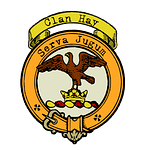Welcome back to "A Clan A Day Podcast," brought to you by BagTownClans.com. I’m your host, Colin MacDonald. Today, we’re exploring the rich and fascinating history of Clan MacDowall, a proud lineage with deep roots in the Norse-Gaelic traditions of medieval Scotland.
The MacDowalls trace their ancestry to Duegald, the grandson of "Prince" Fergus, the Lord of Galloway, who passed in 1164. Fergus, a Norse-Gaelic lord and a descendant of Gille, the Dalriadic Governor of the Western Isles, married Elizabeth, daughter of King Henry I of England, around 1124. This union brought power and prestige to the family. Fergus was granted the lordship of Galloway by King David I of Scotland, solidifying his place as a key figure in the feudal landscape of Scotland.
Duegald, the second son of Uchtred, Fergus’s successor, founded the MacDowall line. As a cadet branch of the ruling family of Galloway, the MacDowalls evolved separately, creating their own identity. Their name, originally “Macdougall in Galloway,” was phonetically pronounced as “mock-dool,” which later led to the spelling variations we see today.
Over the centuries, the name MacDowall has undergone numerous transformations. In 1987, the current clan chief, Professor Fergus D.H. Macdowall of Garthland, formalized the spelling of the clan name with a capital “D.” Today, the clan recognizes over 76 variations of their name, including MacDowell, McDowall, Doyle, and even Duvall, reflecting the far-reaching influence of the clan. These variations arose through migrations and regional adaptations, especially in Ireland during the Plantations of Ulster and later in the Americas.
During the Wars of Independence, the MacDowalls’ history was closely tied to the turbulent politics of Scotland. In 1296, Sir Dougal Macdowall and his brother Fergus swore fealty to King Edward I of England by signing the infamous Ragman Roll. As defenders of Galloway, the MacDowalls initially supported the Baliol claim to the Scottish throne. However, when Robert the Bruce invaded Galloway in 1306, the clan suffered greatly. Despite these hardships, their resilience allowed them to maintain their prominence and reclaim their lands.
Sir Dougal’s descendant, Sir Fergus MacDowall of Garthland, played a pivotal role during this period. Fighting against English forces at the Battle of Homildon Hill in 1402, he was captured but later ransomed, a testament to his valor and status. This marked the beginning of a long tradition of service and sacrifice for the MacDowalls.
The clan’s history is filled with acts of bravery and dedication. Many MacDowalls lost their lives at Flodden in 1513, fighting alongside James IV of Scotland. Others fell at the Battle of Pinkie Cleugh in 1547. The MacDowalls were unflinching in their loyalty to Scotland, often paying the ultimate price in its defense.
Over time, the MacDowalls transitioned from being feudal warriors to influential landowners and political figures. By the 17th and 18th centuries, leaders like James MacDowall and William MacDowall served as members of the Scottish Parliament for Wigtownshire. Their contributions extended beyond Scotland, with many clan members emigrating to Ireland and North America, where they established a lasting legacy.
Today, Clan MacDowall is led by Professor Fergus D.H. Macdowall of Garthland, the 36th Chief of the Name and Arms. The ancestral seat of Garthland Castle in Wigtownshire, built around 1211, now lies in ruins, but the modern clan seat is Barr Castle near Lochwinnoch in Renfrewshire. The chief has played a significant role in preserving the clan’s heritage and ensuring its traditions continue to thrive.
The heraldic symbols of Clan MacDowall reflect its noble origins. The clan’s coat of arms features a silver lion rampant, crowned with a golden ducal coronet, set against a blue field. This imagery links the clan to the ancient Lordship of Galloway. Their motto, “Vincere vel Mori” (Conquer or Die), speaks to their resilience and determination. The clan’s plant badge, a sprig of oak leaves, symbolizes strength and endurance.
In 2007, the MacDowall tartan was designed by the current chief, incorporating elements of the Galloway landscape. The tartan includes white to represent the clan’s diaspora, green for the oak badge and Galloway hills, and blue for the Irish Sea. Officially registered in 2008, it provides clan members with a distinct symbol of their shared heritage.
The MacDowalls have numerous cadet branches, including the MacDoualls of Logan and the MacDowalls of Freugh, each with its own storied history. These branches contributed to the clan’s enduring presence in southwestern Scotland and beyond.
The MacDowalls are now a global clan, with members scattered across the world. From medieval battlefields to modern communities in North America, the MacDowalls have carried their traditions far and wide. Organizations like the Clan MacDougall Society of North America ensure these traditions are preserved, connecting MacDowalls everywhere to their rich heritage.
From their Norse-Gaelic origins to their modern legacy, Clan MacDowall embodies a story of resilience, loyalty, and adaptation. Their history is a testament to the enduring strength of Scottish clans and their ability to thrive across centuries and continents.
Thank you for joining us for today’s episode of "A Clan A Day Podcast." Be sure to tune in tomorrow as we continue to uncover the fascinating histories of Scotland’s great clans. I’m Colin MacDonald, and as always, Go n-éirí an bóthar leat.











